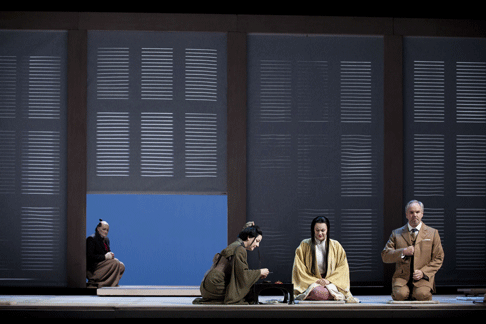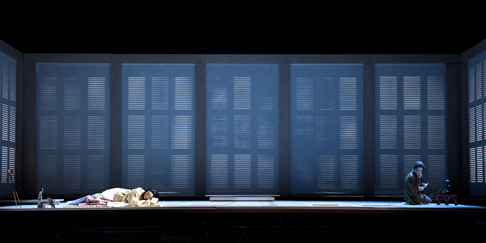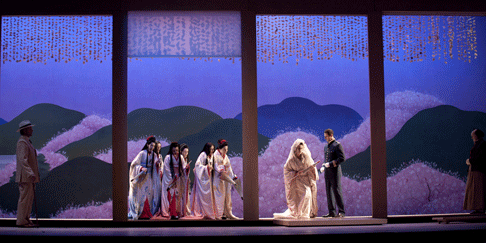![Patrice Caurier and Moishe Leiser [Photo courtesy of The Royal Opera House]](http://www.operatoday.com/Butterfly_ROH_2011_04.gif)
27 Jun 2011
Madama Butterfly by Caurier and Leiser
Patrice Caurier and Moshe Leiser’s Madama Butterfly is such a classic that it is being filmed for the second time at the Royal Opera House, London.
English Touring Opera are delighted to announce a season of lyric monodramas to tour nationally from October to December. The season features music for solo singer and piano by Argento, Britten, Tippett and Shostakovich with a bold and inventive approach to making opera during social distancing.
Conductor Oliver Zeffman has commissioned the very first opera for a socially distanced world, which is now available to watch exclusively on Apple Music. Eight Songs From Isolation has been written by eight leading composers, specifically for streaming - rather than live performance - and is the first opera written for a time when the performers were unable to meet in person.
Leading freelance musicians unite in Parliament Square to call for targeted support for colleagues in the arts and entertainment sector.
Duo Lewis Murphy (composer) and Laura Attridge (writer) have launched a charitable song project entitled Notes From Isolation. The resulting songs, featuring some of the UK's top singing talent, are being released online between August and October 2020 and can be enjoyed free of charge.
The Royal Opera House is thrilled to announce an exciting, wide-ranging new line-up for its autumn programme. For the first time, extraordinary performances will be accessible online for a global audience through livestreams and for socially distanced live audiences at our home in Covent Garden. In a global first, we present a new opera in hyper-reality, alongside repertory favourites from both artistic companies.
Some of the most famous and outstanding stars from the opera world are to take part in a very special evening from Wexford Festival Opera, including Aigul Akhmetshina, Joseph Calleja, Daniela Barcellona, Juan Diego Flórez, Igor Golovatenko, Ermonela Jaho, Sergey Romanovsky, and many more.
Following its successful launch in 2019, OperaStreaming streams nine operas on YouTube from the historic opera houses of Emilia-Romagna during the 2020-21 season, with fully-staged productions of Verdi's La traviata in October from Modena and Verdi'sOtello from Bologna in...
‘A brief history of song’ is the subtitle of the 2020 Oxford Lieder Festival (10th-17th October), which will present an ambitious, diverse and imaginative programme of 40 performances and events.
Bampton Classical Opera returns to the Baroque splendour of London’s St John’s Smith Square on November 6 with a concert performance of Gluck’s one-act opera The Crown, the first in the UK since 1987. The performance will also be filmed and available to watch on demand on the Bampton website from 9 November.
While many of us spent lockdown at home taking it a little easier, composer Andrew Synnott wrote an opera.
Owen Wingrave is part of the new Interim Season of 19 brand new events, all free to view online between September and December 2020.
The Arts Council has awarded innovative UK charity Music and Theatre For All (MTFA) a major new grant to develop three ambitious new projects in the wake of Covid 19.
English National Opera (ENO) will reopen the London Coliseum to socially distanced audiences on 6 and 7 November for special performances of Mozart’s Requiem. These will provide audiences with an opportunity to reflect upon and to commemorate the difficulties the nation has faced during the pandemic.
The Royal Opera House is proud to continue its curated #OurHouseToYourHouse programme into the autumn, bringing audiences the best of the ROH through a new series of Friday Premieres and cultural highlights.
After six months of closure, the Royal Opera House is thrilled to be opening its doors to the public as part of Open House London weekend, giving visitors a taste of one of the world’s most famous theatres for free.
The Academy of St Martin in the Fields is thrilled to announce re:connect - an eight concert series with live socially distanced audiences at its namesake church, St. Martin-in-the-Fields. The autumn concerts will take place at 5pm & 7:30pm on two Saturdays per month with guest artists including baritone Roderick Williams, soprano Carolyn Sampson and composer-conductor-pianist Ryan Wigglesworth performing a wide range of repertoire.
Music and poetry unite and collide across centuries, from the Medieval to the Enlightenment to the present day. This year, the Oxford Lieder Festival will present a thrilling and innovative programme comprising more than forty events streamed over eight days.
The English Concert with artistic director Harry Bicket is delighted to announce a series of concerts from 1-15 October 2020. The concerts take place in historic London venues with star soloists and will be performed and streamed live to a paying audience at 7pm GMT on each performance date. The programmes include first-class vocal and instrumental works from the two pillars of the English Baroque, covering different aspects of the repertoire.
Glyndebourne has announced plans for a ‘staycation’ series of socially-distanced indoor performances, starting on 10 October 2020.
The Royal Opera House is delighted to announce two packed evenings of opera and ballet, live from our stage in Covent Garden and available to view wherever you are in the world online.
![Patrice Caurier and Moishe Leiser [Photo courtesy of The Royal Opera House]](http://www.operatoday.com/Butterfly_ROH_2011_04.gif)
Patrice Caurier and Moshe Leiser’s Madama Butterfly is such a classic that it is being filmed for the second time at the Royal Opera House, London.
Leiser and Caurier hardly need an introduction. Over the last thirty years, they’ve created nearly 80 productions, all over the world.
Caurier and Leiser are directing the fourth revival of their acclaimed Madama Butterfly, first produced in 2003. This revival is being filmed for the BP Summer Big Screen on 4th July and recorded in 3D for cinema release. They arrive fresh from the dress rehearsal, where gigantic film cameras soared over the stage, and dollies moved up close to the singers. “Very up close!”, says Caurier. “The first film of this production was made in 2003 by the BBC", says Leiser. "…They were wonderful, they worked very closely with us, and the result was good". Directing for film and directing for stage are different disciplines, and the new 3D technology is more different still.”
“We changed nothing in the production for this film and had no say in the direction or the technology”, says Lieser. “The revival was decided long ago. We agreed because you have to accept that media is changing, but we have no input at all in this filming…
"We think of ourselves as acting directors” says Caurier. “For us, what is going on inside the characters and between the characters is most important, and hopefully that’s what will come across…. "Primarily, what we do is theatre”, Leiser adds, “no ‘empty singing’ or people standing around”.
“Madama Butterfly is a tragedy, not a melodrama”, says Leiser. “What really mattered to us is that the opera speaks about something very important that still exists today.” “Sex tourism” adds Caurier. “But on a wider plane it is about how people who have more take advantage of people who have less and are in more difficult situations. This opera is about human beings”, says Leiser, “and how people like Pinkerton have complete non-understanding of anyone else’s culture. Absolutely, this is serious and it is tragedy”.
“Madama Butterfly is political”, says Caurier, “Totally! But we are but we are not there to show a lesson. Puccini shows the situation so people can make their mind up though it’s not very hard if they think about it. That allows us to make the story true. There are a lot of different scenes and moments of lightness, which build up to very strong story telling. What’s wonderful is that there is such an incredible variety of feelings. Madama Butterfly is a fantastic part for a singer because there are so many different situations and emotions. She’s an innocent young girl, then she matures. Sometimes she’s weak, sometimes she’s extremely forceful. All of them precisely characterized in the music and libretto. Our goal when we do Madama Butterfly is to make the emotions happen on stage like they are real”.
 Scene from Madama Butterfly [Photo by Mike Hoban courtesy of The Royal Opera House]
Scene from Madama Butterfly [Photo by Mike Hoban courtesy of The Royal Opera House]
“Music means nothing in itself”, says Leiser, “but it becomes meaning in conjunction with words. Opera singers start with the tune, but composers start with ideas and with words. We work with the singers around the music, because that’s their way of expressing themselves” says Caurier. “We get them to think about why things are written in the score, why one passage is forte, another piano. Why, and how to make something of the markings and feelings, so there’s no moment of ‘empty singing’ and it’s full of meaning”
“In a story like Madama Butterfly”, says Caurier, “It would be terrible if it was just entertainment. It’s too much about human truth and real situations We don’t do beautiful for itself. In this production we made an aesthetic choice not go for ‘folklore’ but for Zen-like purity, the essence of Japanese art, where tiny gestures mean something , and the way people hide their feelings even though they feel deeply. It’s not a beautiful story, it’s awful, it’s violent. Yes, you see the flowers but you must have the smell of blood running through them”.
“Go and look at Japanese woodblocks or paintings. There is a lot of blank space, but there are stories behind the images. Never just milk and honey or the perfume of roses!” says Leiser. “Oui, oui, absolument!” Caurier interjects. “And that’s the way our production looks the way it does , it’s not to indulge. Even the magnolia tree at the end, it’s there because at the moment Butterfly dies, it dies too, and you realize how suddenly life can end.”, says Lieser. “And how a country can be destroyed”, adds Caurier. “Our aim is to be subtle and understated but at every moment I hope that the tension of the tragedy appears”
“Butterfly is very intense”, says Caurier, “She suffers from beginning to end but the last thing we want to see is one emotional colour on stage. It’s important to show the different dimensions and how they develop. That means a non-superficial approach. No ‘generalized weeping’, that’s not right. Every moment has a precise colour, which is specified in the music.”
 Scene from Madama Butterfly [Photo by Mike Hoban courtesy of The Royal Opera House]
Scene from Madama Butterfly [Photo by Mike Hoban courtesy of The Royal Opera House]
Lieser explains, phrase by phrase, the aria un bel di vedremo, “Butterfly is imagining many different situations — the smoke, the ship entering the harbour, the steep climb up the hill, her wedding gown, and Pinkerton’s final return. In each thought a different shading, it is not all one colour. And that’s just one aria. But we have three hours with so many details, like Butterfly rejecting Suzuki’s gods, and proudly telling Sharpless he’s in an ‘American home’…It’s these small articulations that build up to really tell us who Butterfly is, who Pinkerton is and so on. That’s the real story. In a bad production, you get a generalized idea, but in a good production every one of these articulations need to be developed. All these little fragments are put together so you build up a real human being”.
“Even Pinkerton is a complex character”, says Caurier. “What he says in the beginning is terribly cynical, yet when Butterfly arrives, he’s completely fascinated by this exotic woman, her youth and her beauty. He is sincerely attracted to her. It is sexual, and he knows in his heart it will not last. But for the moment, he means it. That’s important because if he was only a bastard, it would be appalling”.
Leiser adds “The music and the libretto are so deep. Pinkerton isn’t just a ‘bad American’. It’s much more than one dimensional. He wants to abuse a girl of 15 which he would never get away with if he was in America. He’s arrogant and insensitive, but he also shows remorse. That’s why he takes the child away. He assumes that it’s best for the child. The decision is taken quickly, he just expects Butterfly to obey”.
“This opera is a very thoughtful study of the way colonialism works. The Consul, Sharpless, has humanity. He’s been in the country long enough that he has learned to understand the culture. He saw Butterfly in the consulate and knows that she is taking the marriage seriously. He thinks what Pinkerton is doing is wrong, but he cannot go as far as protecting Butterfly because he’s obliged to support American interests.”
 Scene from Madama Butterfly [Photo by Mike Hoban courtesy of The Royal Opera House]
Scene from Madama Butterfly [Photo by Mike Hoban courtesy of The Royal Opera House]
“It’s the colonial mentality”, says Caurier. “And Goro is from the same culture as Butterfly but he makes money by making these arrangements and selling women….It's a situation that can happen all over the world, with different people. It’s not like all Americans are bad and all Japanese are good, it’s much more complicated.”
“People are right to want to kill directors”, says Leiser, “because our primary role is to give people what they don’t expect. With pure music, most people can’t criticize precisely unless they know music and know the score very well. But everyone has mental images of what things should look like. But what we are doing is art. You don’t go to a museum to look at Picasso and then complain it’s not photo-realism like Vermeer”.
“Audiences get attached to images that might not tell the story properly. Like the red rose Carmen is supposed to wear in her hair”, says Caurier. “Everyone demands that, but in the libretto it’s a small yellow flower, like a mimosa but more humble”. “She could be wearing a rhododendron”, adds Leiser, “but it’s not about the flower at all. It’s about what’s happening to Carmen and who she is. It is about how you define freedom. The yellow flower grows in the wild, and when it’s picked it soon dies. Like Carmen.”
“The trouble is that some audiences don’t appreciate that opera [is] art but think in consumer terms”, Leiser adds. “It’s marketing. People want a hamburger that looks like a hamburger. You can put in better quality meat and even a better salad, but people want what they are used to. That’s the danger with film, because it fixes images forever. But opera is a place to expose yourself to the genius of a composer, and to the interpretations of conductor, singers and directors. No one can claim that any one vision is the absolute truth but it is a vision, like it or not. When you come to the opera you can open your ears and your eyes and most of all your soul and take in what is happening…In real live theatre, every performance is slightly different. That’s what keeps live opera healthy. Like a plant it must keep growing to survive. It’s not something that exists just to be consumed.”
“Just like Pinkerton”, says Caurier sagely. “Pinkerton isn’t interested in Japan or even in Butterfly’s feelings, he has just come to consume for his own interests". And look what happens to Butterfly.
Anne Ozorio
For more information please see the Royal Opera House’s web site.